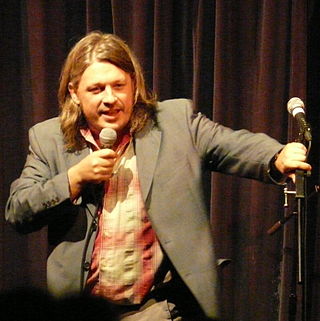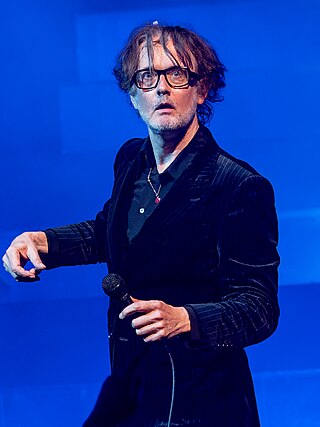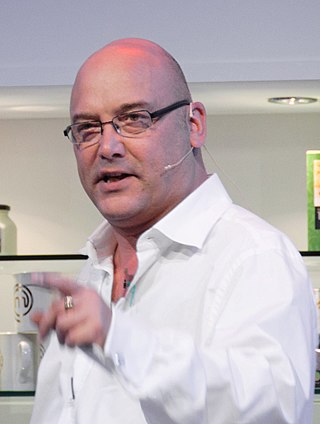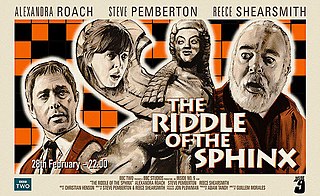Related Research Articles

Matthew Keith Hall, known professionally as Harry Hill, is an English comedian, presenter and writer. He pursued a career in stand-up following years working as a medical doctor, developing an off-beat, energetic performance style that fused elements of surrealism, observational comedy, slapstick, satire and music. When performing, he usually wears browline glasses and a dress shirt with a distinctive oversized collar and cuffs.

Simon Phillip Hugh Callow is an English actor. Known as a character actor on stage and screen, he has received numerous accolades including an Olivier Award and Screen Actors Guild Award as well as nominations for two BAFTA Awards. He was made a Commander of the Order of the British Empire (CBE) for his services to acting by Queen Elizabeth II in 1999.

Richard Keith Herring is an English stand-up comedian and writer whose early work includes the comedy double act Lee and Herring. He is described by The British Theatre Guide as "one of the leading hidden masters of modern British comedy".

Alexei David Sayle is an English actor, author, stand-up comedian, television presenter and former recording artist. He was a leading figure in the British alternative comedy movement in the 1980s. He was voted the 18th greatest stand-up comic of all time on Channel 4's 100 Greatest Stand-Ups in 2007. In an updated 2010 poll he came 72nd.

Jarvis Branson Cocker is an English musician and radio presenter. As the founder, frontman, lyricist and only consistent member of the band Pulp, he became a figurehead of the Britpop genre of the mid-1990s. Following Pulp's hiatus, Cocker has pursued a solo career, and for seven years he presented the BBC Radio 6 Music show Jarvis Cocker's Sunday Service.

Jeremy James Hardy was an English comedian. Born and raised in Hampshire, Hardy studied at the University of Southampton and began his stand-up career in the 1980s, going on to win the Perrier Comedy Award at the Edinburgh Festival Fringe in 1988. He is best known for his appearances on radio panel shows such as the News Quiz and I'm Sorry I Haven't a Clue.

John Galbraith Graham MBE was a British crossword compiler, best known as Araucaria of The Guardian. He was also, like his father Eric Graham, a Church of England priest.

Little Britain is a British sketch comedy series that began as a radio show in 2000 and ran as a television series between 2003 and 2006. It was written and performed by David Walliams and Matt Lucas. Financed by the BBC, the radio series was first broadcast on BBC Radio 4, with the initial two television series premiering on BBC Three and the third and final series on BBC One.

Martin John Christopher Freeman is an English actor. Among other accolades, he has won two Emmy Awards, a BAFTA Award and a Screen Actors Guild Award, and has been nominated for a Golden Globe Award.

Peter John Sallis was an English actor, known for his work on British television. He was the voice of Wallace in the Academy Award-winning Wallace and Gromit films and played Norman "Cleggy" Clegg in Last of the Summer Wine from its 1973 inception until the final episode in 2010, making him the only actor to appear in all 295 episodes. Additionally, he portrayed Norman Clegg's father in the prequel series First of the Summer Wine.

John Patrick Thomson is an English comedian, narrator and actor best known for his roles in The Fast Show, Men Behaving Badly, Cold Feet, 24 Hour Party People, The Brothers Grimsby and Coronation Street.
Betty Smith, known by the stage name Liz Smith, was a British character actress, known for her roles in BBC sitcoms, including as Annie Brandon in I Didn't Know You Cared (1975–1979), the sisters Bette and Belle in 2point4 Children (1991–1999), Letitia Cropley in The Vicar of Dibley (1994–1996) and Norma ("Nana") in The Royle Family (1998–2006). She also played Zillah in Lark Rise to Candleford (2008) and won the BAFTA Award for Best Actress in a Supporting Role for the 1984 film A Private Function.

Josie Isabel Long is an English comedian. She started performing as a stand-up at the age of 14 and won the BBC New Comedy Awards at 17.

Robin Ince is an English comedian, actor and writer, known for presenting the BBC radio show The Infinite Monkey Cage with physicist Brian Cox, creating Nine Lessons and Carols for Godless People, co-creating The Cosmic Shambles Network, and his stand-up comedy career.
Alan Connor is a British writer, journalist and television presenter. First seen on Channel 4's youth entertainment programme The Word in 1995, he later appeared on The Big Breakfast and BBC Radio Five Live and was a BBC News correspondent, appearing on BBC News 24 and The Daily Politics.

Gregg Allan Wallace is an English broadcaster, entrepreneur and writer. He is known for co-presenting MasterChef, Celebrity MasterChef and MasterChef: The Professionals on BBC One and BBC Two. He has written regularly for Good Food, Now and Olive magazines.

Anthony Lawrence Allen was an English comedian and writer. Known as the "godfather of alternative comedy", Allen was one of the original alternative comedians. In May 1979, following notoriety at Speakers' Corner with his "Full-Frontal Anarchy Platform", he began to perform at The Comedy Store. Two months later he founded Alternative Cabaret with Alexei Sayle and ran a regular "Alt Cab" Club night in the back bar of the Elgin pub on Ladbroke Grove in London.

John David Finnemore is a British comedy writer and actor. He wrote and performed in the radio series Cabin Pressure, John Finnemore's Souvenir Programme, and John Finnemore's Double Acts, and frequently features in other BBC Radio 4 comedy shows such as The Now Show. Finnemore has won more Comedy.co.uk awards than any other writer, and two of his shows appear in the top ten of the Radio Times' list of greatest ever radio comedies.
Mick Gold is a British documentary film maker, photographer and journalist, who has written for publications such as Creem, Melody Maker, and Let It Rock.

"The Riddle of the Sphinx" is the third episode of the third series of the British dark comedy anthology television programme Inside No. 9. It first aired, on BBC Two, on 28 February 2017. The episode was written by the programme's creators, Steve Pemberton and Reece Shearsmith, and directed by Guillem Morales. "The Riddle of the Sphinx", which is set in Cambridge, stars Alexandra Roach as Nina, a young woman seeking answers to the Varsity cryptic crossword, Pemberton as Professor Nigel Squires, who pseudonymously sets the crossword using the name Sphinx, and Shearsmith as Dr Jacob Tyler, another Cambridge academic. The story begins with Nina surreptitiously entering Squires's rooms on a stormy night and being discovered; this leads to Squires teaching her how to decipher clues in cryptic crosswords.
References
- 1 2 3 4 5 Williams, Richard (21 July 2016). "John Pidgeon obituary". The Guardian. Retrieved 21 July 2016.
- 1 2 3 4 5 "John Pidgeon, journalist, radio producer and Telegraph crossword compiler – obituary". The Daily Telegraph. London. 22 July 2016. Retrieved 25 July 2016.
- ↑ New Musical Express, 8 July 1972
- ↑ Let It Rock, January 1974
- ↑ Creem, October 1973
- ↑ Panther Books, 1976
- ↑ Popular Music and Society, Vol 33, Issue 4, October 2010
- ↑ Mark Kermode, It's Only A Movie, Arrow Books, 2010
- ↑ Panther Books, 1975
- ↑ Sounds, 8 March 1975
- ↑ Eric Clapton, Panther Books, 1975
- ↑ Time Out, 17 May 1974
- ↑ Melody Maker, 12 October 1978
- ↑ Melody Maker, 2 December 1978
- ↑ Pidgeon, John (24 August 2007). "'Whatever we do, this will always be the seminal band'". The Guardian. Retrieved 23 July 2016.
- 1 2 Armstrong, Stephen (22 August 2005). "Fun and Fame". The Guardian. Retrieved 23 July 2016.
- ↑ "A ‘little guy’ making some outstanding radio" (Tim Blackmore, Broadcast, 28 July 1995)
- ↑ Pidgeon, John (12 May 2008). "How we developed great comedy, despite Radio 4". The Guardian. Retrieved 23 July 2016.
- ↑ Wallace, Danny (7 July 2008). "My Life In Media: Danny Wallace" . The Independent. Archived from the original on 13 June 2022. Retrieved 23 July 2016.
- ↑ "Toughie No 560 by Petitjean", (gnomethang, Big Dave's Crossword Blog, 11 May 2011)
- 1 2 University of Kent Special Collections & Archives. "John Pidgeon Collection". University of Kent Special Collections & Archives Catalogue. Retrieved 15 May 2024.
- 1 2 "John Pidgeon Collection". Special Collections and Archives - University of Kent. 6 December 2021. Retrieved 15 May 2024.